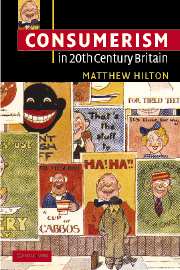Book contents
- Frontmatter
- Contents
- List of illustrations
- Acknowledgements
- List of abbreviations
- Introduction: luxury's shadow
- Part I Necessity
- Part II Affluence
- 6 The new consumer: good housewives and enlightened businessmen
- 7 The professionals: the origins of the organised consumer movement
- 8 Individualism enshrined: the state and the consumer in the 1960s
- 9 The right to shop: consumerism and the economy
- 10 The duty of citizens: consumerism and society
- 11 Affluence or effluence: globalisation and ethical consumerism
- Conclusion: the quantity or the quality of choice
- Bibliography
- Index
9 - The right to shop: consumerism and the economy
Published online by Cambridge University Press: 10 December 2009
- Frontmatter
- Contents
- List of illustrations
- Acknowledgements
- List of abbreviations
- Introduction: luxury's shadow
- Part I Necessity
- Part II Affluence
- 6 The new consumer: good housewives and enlightened businessmen
- 7 The professionals: the origins of the organised consumer movement
- 8 Individualism enshrined: the state and the consumer in the 1960s
- 9 The right to shop: consumerism and the economy
- 10 The duty of citizens: consumerism and society
- 11 Affluence or effluence: globalisation and ethical consumerism
- Conclusion: the quantity or the quality of choice
- Bibliography
- Index
Summary
In a speech at an international consumer conference in 1964, Michael Young, the founder of the Consumers' Association, questioned the focus his own organisation had placed on rational, individualist, affluent, value-for-money, choice-based consumerism. Reflecting the social democratic concerns that inflected the type of consumerism to be explored in chapter 10, Young highlighted three dilemmas that the consumer movement faced: (i) the needs of the poor versus the needs of the rich; (ii) the claims of commercial products versus public services; and (iii) the standard of living versus the quality of life. His answer was to urge for a broader consumer movement, one that showed that consumers, as Henry Epstein of the Australian Consumers' Association had put it in an earlier speech, ‘don't intend to march around in a circle to a tune played with one finger on a cash register’. Of the first dilemma, Young argued that consumerism must acknowledge that many consumers in the developing world had no choice at all and he advocated that western consumers donate 1 per cent of their annual incomes to development projects directed by the International Organisation of Consumers' Unions. Of the second, he argued that consumerism should now turn its attention to public services, consumers using their collective voice to get not just more efficient public services, but more of them in total.
- Type
- Chapter
- Information
- Consumerism in Twentieth-Century BritainThe Search for a Historical Movement, pp. 242 - 267Publisher: Cambridge University PressPrint publication year: 2003



